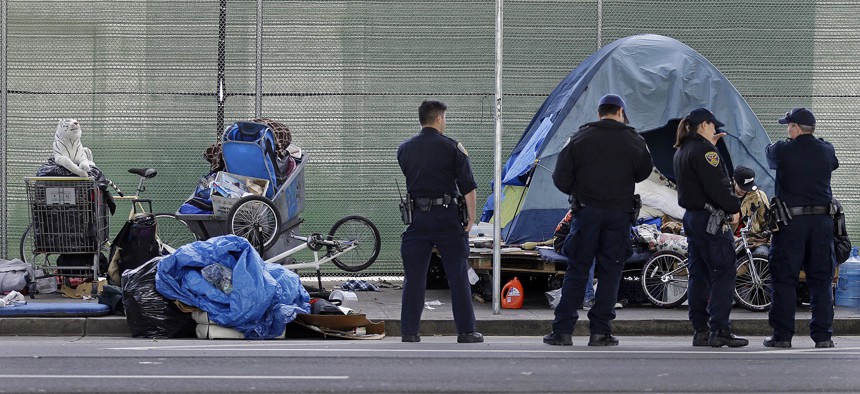Supreme Court Declines to Consider Homeless Camping Ban Case

In this March 1, 2016, file photo, San Francisco police officers wait while homeless people collect their belongings in San Francisco. AP Photo/Ben Margot
The high court is leaving in place an appellate court ruling that found it was unconstitutional to prosecute homeless people for sleeping in public outdoors when no shelter was available.
The U.S. Supreme Court on Monday said it will let stand a case that protects homeless people from being prosecuted for sleeping on the streets.
Concerned with the growth of homeless encampments, and the health and safety issues they pose, dozens of cities and states had asked the high court to hear the case in the hopes it would clarify, if not overturn, a lower court ruling.
The 9th U.S. Circuit Court of Appeals in 2018 ruled that a Boise, Idaho law banning people from sleeping outdoors on public property was unconstitutional. The court found that when there is no option of sleeping indoors, “the government cannot criminalize indigent, homeless people for sleeping outdoors, on public property, on the false premise they had a choice in the matter.”
Six homeless individuals brought the case against Boise, Idaho after they received citations for sleeping outdoors.
The 9th Circuit ruling applies to nine Western states. Dozens of cities and states had asked the high court to take up the case.
Some, like Los Angeles, agreed with the underlying finding in the Boise case that people should not be prosecuted for sleeping on the streets if no shelter is available. However, in an amicus brief filed with the Supreme Court, Los Angeles said it does not have the capacity or resources to be able to provide beds for the 27,000 unsheltered homeless people who live in the city.
Los Angeles City Attorney Mike Feuer told the KCPP radio program Air Talk that operating under the 9th Circuit’s guidance will make it more difficult to address the needs of the city’s large population of homeless people.
"Now, as the city seeks to implement rules that, in my view, need to effectively balance rights and legitimate interests of homeless residents with those of other residents and businesses, it's likely those rules will be challenged in court,” he said. "As we have said from the beginning, that litigation undoubtedly will dissipate resources that are better spent on finding concrete, practical solutions to this crisis."
Others argued that the ruling’s caveat requiring cities to know whether or not shelter was available before prosecuting someone for sleeping outdoors was unworkable.
The League of Oregon Cities said compliance with the ruling is next to impossible given the difficulty in counting a jurisdiction’s homeless population and determining exactly how many shelter beds are needed. Further, the group said many shelters run by religious organizations would not count toward the number of shelter beds because of issues raised in the ruling about shelters that require people to take part in religious programs.
Six states argued that the Boise ruling should be overturned because it infringed on their right to protect the public health and safety.
Homeless advocacy groups cheered the decision, saying it will make cities focus on finding real solutions to end homelessness.
“Cities can still address encampments on their streets, they just have to do it in constructive ways that reduce harm and actually help end homelessness,” said Eric Tars, legal director at the The National Law Center on Homelessness and Poverty.
The Supreme Court issued Monday’s decision to not take the case without further comment on the issue.
Andrea Noble is a staff correspondent for Route Fifty.
NEXT STORY: A Plan for Closing the Gap Between ‘Superstar’ Cities and Other Metro Regions





